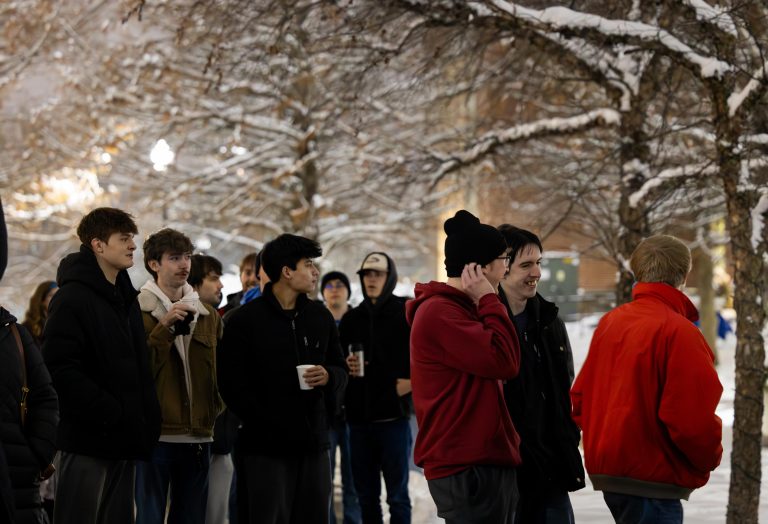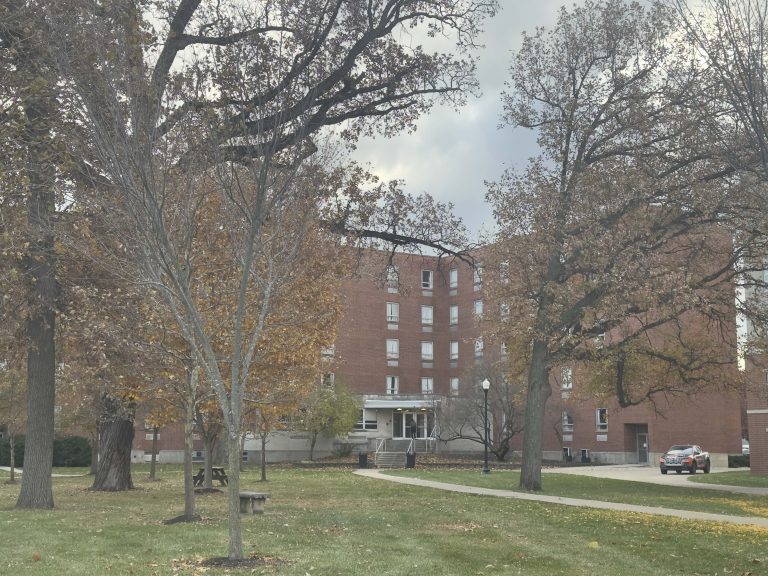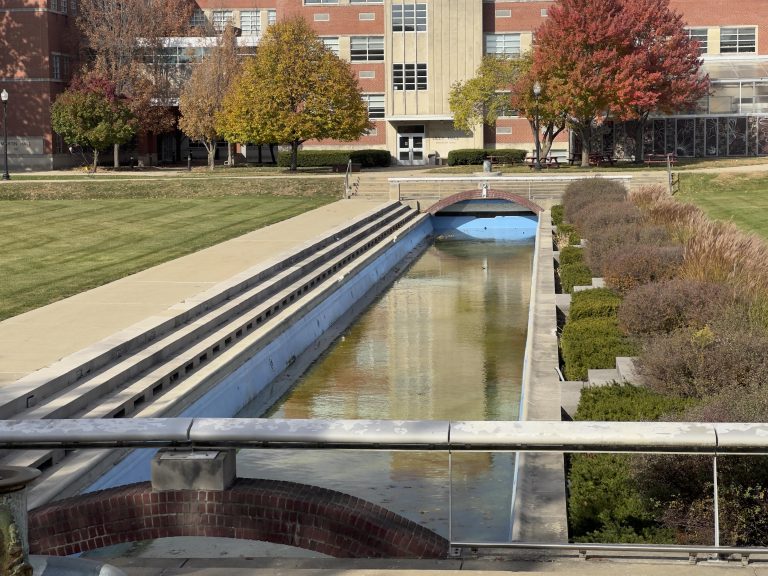The University of Indianapolis is awarding two honorary degrees at the 2018 commencement. Each year, the university selects one to three recipients from a pool of candidates suggested by the community, according to University President Robert Manuel. A faculty committee chaired by Manuel takes the recommendations and debates them and then they are given to the Faculty Senate to approve. If approved, the decision will then be passed to the Board of Trustees. All groups must approve of the recipients before the degrees are offered. Manuel said the whole process takes about eight months and is a huge honor because an honorary degree is a way for an institution’s faculty to signal that a person’s life work is worthy.
“Honorary degrees are ways to signal to the world and our community accomplishments and life experiences that we think are stellar and exemplary of the mission and traditions of the university,” Manuel said. “So it’s kind of the highest honor you can give somebody who hasn’t gone through the educational programs here.”
According to Manuel, the university tries to honor individuals from different disciplines. In previous years, they have recognized alumni and exemplary people in fields such as business, arts, religion and medicine.
“[We] tend to try and move them so that you can represent the entire university’s interests,” Manuel said, “And they can see examples of greatness inside of these people.”
This year’s honorary degree recipients are Senior Pastor of St. Luke’s United Methodist Church Rob Fuquay and 16-time Grammy Award winning banjo player Béla Fleck. According to Manuel, Fuquay was chosen because of UIndy’s United Methodist affiliation and his prominence in the faith. Fleck is one of the finest banjo players and was chosen because of UIndy’s music program, Manuel said.
“It’s an opportunity to celebrate arts and culture and to celebrate our mission through those two people,” he said.

Fuquay has been in ministry for over 30 years, serving six churches including his current appointment. He said he first became interested in becoming a pastor as a teenager, after getting to know the Duke University seminary students that served his church in the summer. He said he was deeply impacted by them because they were real people who were interested in sports and music and that they were a huge influence on his ministry.
“I just remember about my senior year in high school feeling this inner nudge where God was saying, ‘I want you to consider doing with your life what they do.’ And I didn’t even know what that meant,” Fuquay said. “But I went and talked to my pastor about it and he helped me understand what it was like to get a call to ministry and that while you might not be certain of it, that the only way you will ever get certain is to start walking in that direction and so that’s what I did, and it got stronger.”
Fuquay attended Pfeiffer University in North Carolina and studied religion. After graduating, he went straight to seminary at the Candler School of Theology at Emory University in Georgia. He pastored a church in England after he graduated, then returned home to serve in the North Carolina Conference of the United Methodist Church.
He moved to Indiana with his wife and three daughters in 2011, after St. Luke’s conducted a search for a new senior pastor and offered the position to him.
In addition to his years in ministry, Fuquay has also written three books, “The God We Can Know,” which is based on the “I am” sayings of Jesus, “Take the Flag,” which uses NASCAR and IndyCar Series flags as metaphors and “Which Way Lord,” which uses the life of the apostle Paul to consider life purposes.
Fuquay said that he was honored to be offered the honorary degree. He said he wants to represent the university and the United Methodist Church well throughout the remainder of his career.
“I think shocked if a fair word to use. I was just taken aback. [It was] not something I was expecting at all,” Fuquay said. “So, I am so hugely honored by this and really looking forward to that date in May. And it’s much as the degree, an honorary degree, as it is UIndy. The fact that I’m being awarded this by UIndy, such a respected school, that’s a huge part of the honor for me.”

Fleck said he first became interested in the banjo at five years old after hearing it on “The Beverly Hillbillies,” but he did not own one until he was fifteen years old. Fleck began touring directly out of high school, as he was able to play at a professional level. When he began playing banjo he was also playing guitar, fiddle, mandolin and pedal steel, but he said he realized to be a great banjo player he need to focus solely on banjo.
“To really do something at your best you have to focus really, really hard on it for a long time and I was excited about the banjo in that way and I was willing to do that kind of work,” Fleck said. “As I went along, I mean I have to say I was a pretty shallow person because that’s all I did, sit in the room playing banjo. But as time went on, I started to apply that understanding of what made something good to everything in my life and tried to grow as a person more and more.”
Fleck did not attend college, although he said he would have enjoyed going for music studies but there were no programs for the banjo when he graduated high school. Although he did not formally continue his education, Fleck continued his education in other ways.
Fleck said he began by studying jazz with musicians who did not play the banjo and has since learned how to play bluegrass, folk, Irish, Celtic and classical music.
“I also got very interested in the history of the banjo before it came to the Americas, and I went to Africa and made a documentary sort of looking into those roots of the banjo and performing quite a bit for several years with African musicians,” Fleck said. “I also play in a group with a great Indian musician who is possible one of the most well-loved and greatest Indian musicians alive today, a guy named Zakir Hussain. [He is] one of the great professionists tabla players and I’ve been studying with him as I play with him. I’m always learning.”
Fleck said he was thrilled when he learned he had been considered for an honorary degree and that his mother would also be very happy because she always wanted him to go to college and develop other skills.
“It’s a very sweet honor and it validates some of the work I’ve been doing on my own,” Fleck said. “…I’ve been kind of mapping the banjo out as if it was a foreign country or a new language or something, finding my own way around it and developing my own set of language for the instrument. So it’s kind of like being recognized for what you do, which does feel good.”
Fuquay and Fleck will be attending commencement on May 5 to be awarded their degrees. Fleck is going to perform the banjo during the ceremony and Fuquay is going to deliver the commencement address. Fuquay said that he has begun to think about what he wants to convey through his speech.
“I’ve really tried to get more in touch with the thinking of college students, in particular college graduates, or people recently graduated and in the first five years of career or whatever after graduation. What is that outlook on the world like? … People graduating from college, what’s their approach to that world?” Fuquay said. “And you know, I’ve been very impressed by the Parkland students, the Douglas High School in Parkland, Florida and it reminds me of students during Vietnam, which is, ‘We can’t wait anymore for the generations above us to get some things figured out. We’ve got to do this now.’ And I see that and I hear that in their voices. So all of that is kind of stirring within me. I don’t want my message to be just a super serious thing but yet I think it has to have a serious angle to it.”
Fleck is not sure what he plans to play yet, but did have some words of advice for students. Fleck said everyone must find their own path and they cannot use others’ as a blueprint for their life because life is different for everyone.
“I think I would just say that sometimes the road less travelled has some perks. There are things that you can find by deviating from the mainstream,” Fleck said. “And I’ve done that my whole life. I’ve always looked for side areas and if I saw other people doing something, I would avoid that area and I would look for an area where there really wasn’t anybody doing it.”






